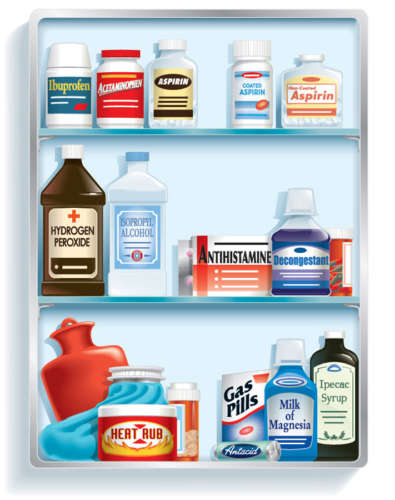
We all have a medicine cabinet, drawer or cupboard in our homes that is filled with seemingly harmless over-the-counter drugs, bandage material and other toiletries. But did you know that many of the things in your medicine cabinet can be potentially dangerous and even lethal? Did you also know that a lot of these items can be replaced with natural substitutes? Let’s explore this a little more.
Painkillers / Anti-inflammatories
Painkillers like Ibuprofen and naproxen can be effective for relieving a headache or reducing inflammation in the joints. But these medications were not designed to be taken on a long term basis and here’s why. Long term usage of NSAIDS (non-steroidal anti-inflammatory drugs) has been proven to eat away at the lining of the gastrointestinal tract, which can then lead to ulcers. They also can increase the risk of heart attack, heart failure and stroke, even in people who have no existing heart conditions. So when you have achy joints or a headache, reach for something more natural. Turmeric and / or ginger are wonderful natural substitutes that can be taken daily to help reduce the pain and inflammation associated with achy joints. For headaches, try a dab of peppermint or wintergreen essential oil on the temples. Also try eating pineapple regularly. Pineapple contains an enzyme known as bromelain. Bromelain is known to reduce inflammation.
Heartburn and Indigestion Medications
Many people suffer from heartburn and indigestion brought on by bad dietary habits and poor lifestyle choices. And when the heartburn flares up, many people reach for proton-pump-inhibitors (PPI’s) like omeprazole or pantoprazole. These medications are proving to be more harmful than helpful though. Numerous studies have linked long term use of PPI’s to kidney failure and even dementia. But for those who suffer with heartburn, it’s really a tricky balancing act that ultimately comes down to what they eat. The pain can be excruciating. PPI’s reduce stomach acid in the gastrointestinal tract, thus reducing pain. Over time though, users of PPI’s can wean themselves off these sometimes harmful medications. Substitutes like aloe vera juice, organic apple cider vinegar, baking soda and cranberry juice can all help reduce excess stomach acid production naturally. While ginger and peppermint can soothe the pain associated with acid reflux, heartburn and indigestion.
Cough Syrup and Cold Medications
Even the healthiest of people will get sick at some point. Over-the-counter cough and cold meds are abundant. And while some may work, they can come with some potentially harmful side effects. Dextromethorphan hydrobromide is a cough suppressant and promethazine is an antihistamine. Both are commonly found in OTC cold medications. These drugs can cause hives, difficulty breathing, facial swelling, dizziness, anxiety, restlessness and nausea, just to name a few of the possible side effects. Plus, there is the potential for abuse if not taken properly. But yet again, there are natural substitutes that have no side effects and in many cases work more effectively. Honey not only helps with a cough, but it also soothes a sore throat. Pineapple juice is another great cough suppressant. Peppermint and thyme are also good for suppressing coughs and opening the sinuses.
When opening up that medicine cabinet, think about this…nearly every OTC medication was once derived from a natural precursor. Aspirin, for instance, is derived from willow bark and the main reason it is now produced in a synthetic pill form is that somebody saw an opportunity to make money. So before you pop a pill, seek out a natural remedy first. This includes things like East Asian Medicine. Acupuncture plus herbal formulas can be a wonderful alternative to those harmful medications. Also, don’t forget to evaluate your daily diet. Diet can play a big role in how your body heals. Just making minor adjustments to your eating habits and adding acupuncture to your health regiment, can alleviate stress, decrease pain and boost your immunity. Remember, you ultimately have the choice when it comes to your health and what you put in your body. Be sure to take the time to make informed decisions that aren’t quite as detrimental.

